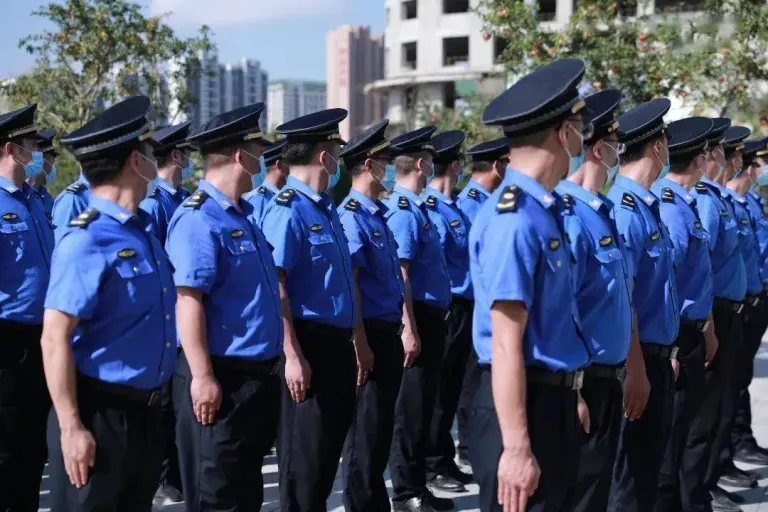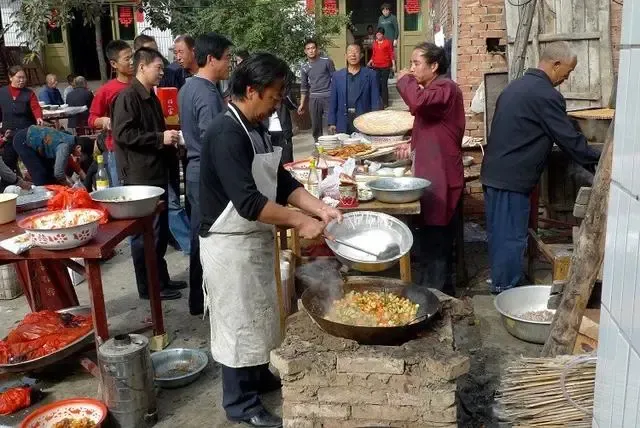
At dusk, the fading sunlight casts long shadows of the city's contradictions on asphalt roads. A young woman hurriedly removes her dark blue uniform jacket in a secluded corner, folding it carefully before placing it into her canvas tote. The embroidered badge reading "Urban Management" disappears into the bag's depths. Minutes later, she stands before a fruit cart, bargaining cheerfully with the vendor over pomelo prices, her fingers still bearing the residual warmth from the uniform's brass buttons.
This daily ritual of uniform removal reveals more than personal preference - it unveils the fundamental tension in China's urbanization process. The municipal management uniform, originally designed to maintain urban order, has paradoxically become a barrier separating public servants from those they serve. When a pancake vendor nervously tells his customer "I need to watch for urban management officers" unaware that the listener herself wears that uniform after sunset, we witness the tragicomedy of modern governance: those tasked with maintaining order must conceal their identities to experience authentic urban life.
This paradox stems from the conflict between standardized governance and humanized survival. Statistical data shows China has over 30 million street vendors, while urban management personnel exceed 2 million. These numbers represent not mere occupational groups, but two survival logics in urban spaces: one prioritizing efficient order, the other clinging to vital warmth. The young officer's daily dilemma mirrors every developing nation's growing pains - how to balance the steel-like rigor of regulations with the jade-like warmth of humanity.
The uniform becomes a symbolic straitjacket. During working hours, it represents legal authority and administrative responsibility; when removed, it reveals the individual's basic needs and emotional vulnerabilities. This transformation exposes the inherent conflict in China's social governance: systematic management often inadvertently suppresses human elements, while spontaneous vitality frequently challenges established order. The officer's psychological struggle - sympathizing with vendors during inspections yet conscientiously performing her duties - constitutes the most poignant annotation to this era.
Urbanization's true test lies not in constructing gleaming skyscrapers, but in resolving such humanistic dilemmas. Shanghai's recent innovative practice offers inspiration: designating specific temporal-spatial zones allowing orderly street vending, while training urban management personnel as "street coordinators." This transforms simple law enforcement into collaborative governance. When officers no longer need to remove their uniforms to interact naturally with vendors, when pancake sellers can operate without constant anxiety, urban civilization will have taken a qualitative leap forward.
This young officer's canvas tote, alternately carrying enforcement documents and fresh fruits, has become an urban version of Pandora's box. When she opens it to retrieve her uniform each morning, what emerges is not disasters but hope - the hope that urban governance can transcend mechanical opposition to achieve symbiotic coexistence. Perhaps the ultimate resolution lies not in choosing between uniforms and civilian clothes, but in redesigning a "uniform" that accommodates both regulatory authority and human warmth.

暮色中,渐暗的天光将城市矛盾的轮廓投射在柏油路上。一位年轻女子在转角处匆匆脱下深蓝色制服外套,仔细折叠后装入帆布包,绣着"城市管理"的徽章隐入包底。十分钟后,她站在水果摊前与商贩欢快讨价还价时,指尖还残留着制服铜扣的余温。
这个每日重复的脱制服仪式,揭示的不仅是个人选择偏好,更是中国城市化进程中的根本性张力。那套为维护城市秩序而生的城管制服,竟悖论性地成为了阻隔管理者与被管理者的结界。当煎饼摊主心有余悸地对顾客说出"得看着城管"时,未曾料想倾听者正是日落后会穿上那套制服的人,我们得以窥见现代治理的悲喜剧——秩序维护者竟需隐藏身份才能触摸真实的城市温度。
这种悖论源于标准化治理与人性化生存的冲突。统计数据显示,中国现有流动摊贩超3000万,城管人员逾200万。这些数字代表的不仅是职业群体,更是城市空间里的两种生存逻辑:一个追求效率至上的秩序,一个紧攥烟火温饱的生存。年轻城管每日经历的撕裂感,恰是每个发展中国家必经的生长痛——如何在钢铁般的制度与玉石般的人性间找到平衡点。
制服成为了象征性的"紧身衣"。工作时代表法律权威与行政责任,脱下后显露个体需求与情感脆弱。这种转换暴露出中国社会治理的深层矛盾:系统化管理常在不经意间压抑人性温度,而自发性的市井活力又时常冲击既定秩序。城管队员在执法时同情摊贩、履职时恪尽职守的心理拉锯,构成了对这个时代最酸楚的注脚。
城市化的真正考验,不在于建造多少玻璃幕墙的摩天楼,而在于化解这样的人文困境。上海近期的创新实践带来启示:划定特定时空允许规范摆摊,同时培训城管队员担任"街道协调员"。这将简单执法转变为协同治理。当城管不必脱下制服就能与摊贩自然互动,当煎饼摊主不必提心吊胆即可安心经营,城市文明便实现了质的飞跃。
年轻城管那个交替装着执法文书与新鲜水果的帆布包,已然成为都市版的潘多拉魔盒。当她每日清晨取出制服穿戴时,释放出的不是灾祸而是希望——期待城市治理能超越机械对立,实现共生共存。或许终极解决方案不在于在制服与便装间抉择,而在于重新设计一套既能承载管理权威、又能容纳人性温度的"新制服"。
